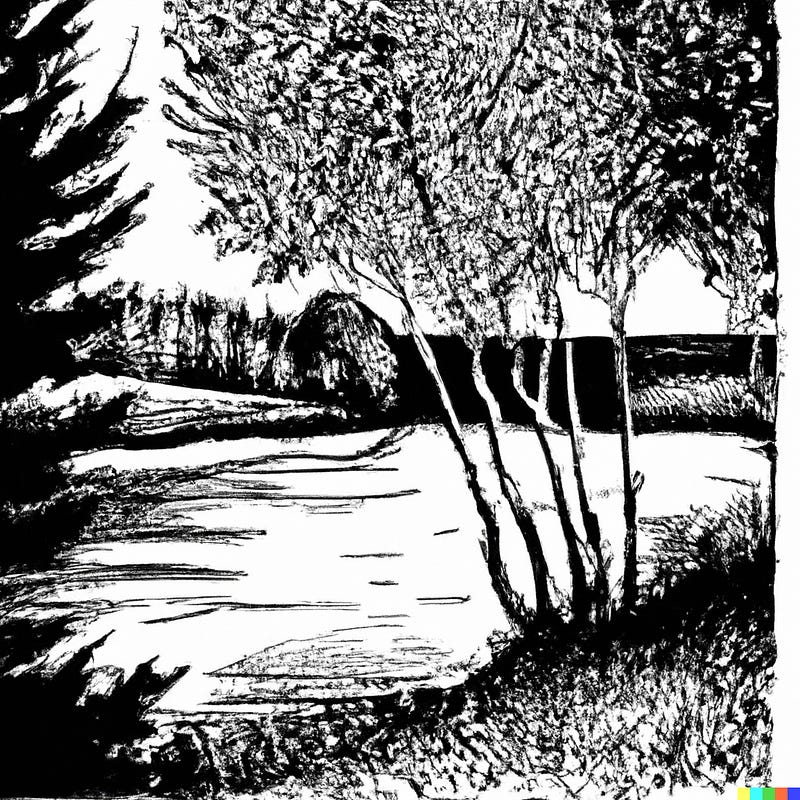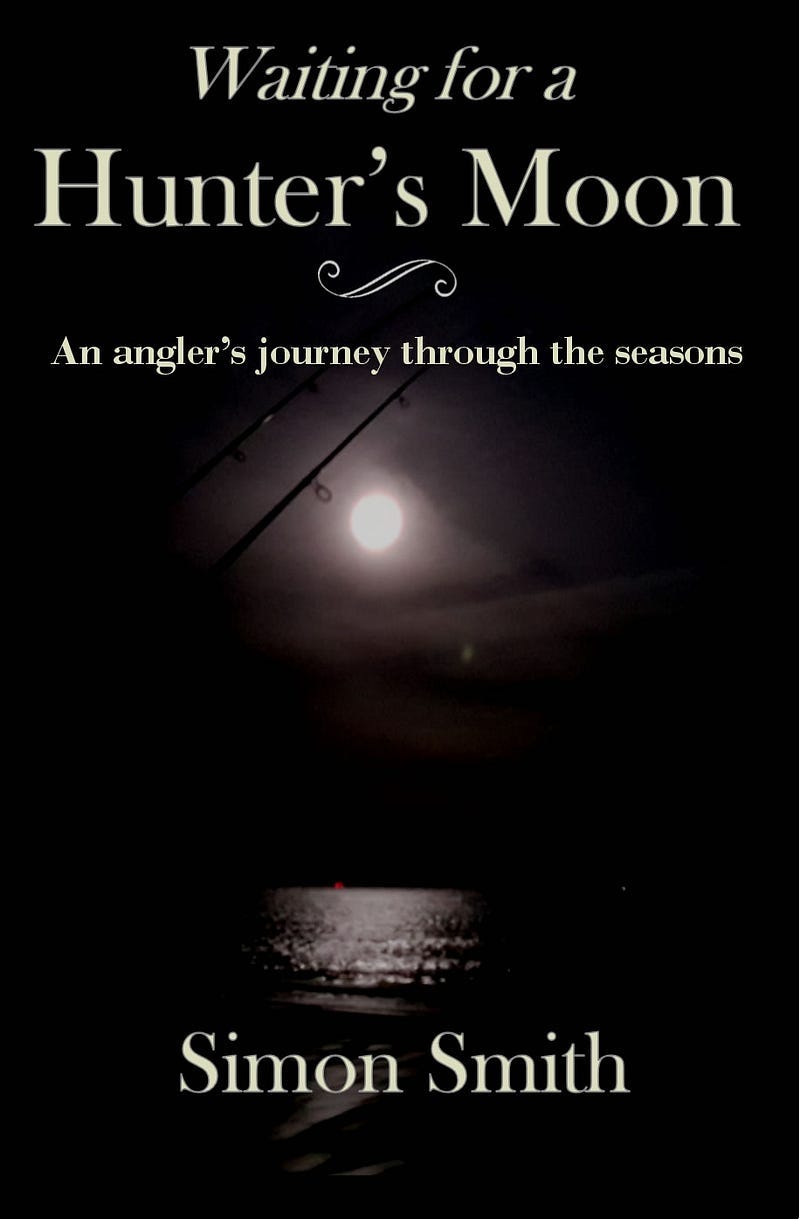Serialisation of ‘Waiting for a Hunter’s Moon’ by Simon Smith

“I have laid aside business and gone a-fishing.”
- Izaak Walton
It’s well past the hottest part of the day and now I’m relaxing in the comfortable residual warmth of early evening. Shadows loosen and pool all around me like spilled coffee, turning the water under the bankside vegetation black as polished obsidian. Minute by minute the grass cools pleasantly around me, my prone body trapping the last pocket of the day’s heat b eneath. The only thing disturbing the stillness is a busy haze of midges befuddling the air a couple of feet away.
The two maggots, impaled on my size fourteen hook, wriggle and wave enticingly as they are gently swung out to land with a plip just a few yards in front of the bank. The waggler bobs gently then slides into place, becoming no more than a yellow pinpoint in its surroundings.
The float dibs once, twice, then slinks languorously out of sight as something makes contact through the stillness. For a second, I am slow to react. Having anything move in such a perfectly still scene seems almost like accepting that a painting can come to life, so perhaps my mind at first refuses to believe that the float has disappeared. After a second it wakes up to its own error and I lift the rod in a belated response. Luckily, the fish is still there, and I instantly meet solid resistance. It’s nothing big — I can tell by the distinct lack of that deep, solid thud-thud that a big fish will send juddering through the shoulder; instead, the sharp, determined rap-rap-rap of something far less grand thrills through my fingers. A few little flicks and plips later and a fin perfect golden rudd is pitched into the landing net, a shiny new pound coin diddering in the bottom of a busker’s hat.
I lift it out, marvelling at this little piece of perfection. How nature can create something so beautiful is always beyond me. The closest comparison to having a rudd in the hand that comes to mind from all the centuries of human achievement is a burnished ingot of Aztec gold, but even this image doesn’t even begin to come close. No gold, with its dead sheen, can come close to the living brilliance of even a small rudd, and I can’t resist one last lingering look as, twisting slightly in my grip, it takes on the running form of the sunset above me, before slipping silently back through my fingers and into the lake.
This was the image I had been feebly grasping at. No, grasping is not the correct verb. Windmilling; mentally I was windmilling at this scene the way a starving man might flail at a limp sandwich suspended on a length of twine six feet above his head. If I could hold onto it for just a minute longer it might help to justify the bloody-minded idiocy in which I had literally found myself ankle deep at that moment.
So, the story begins. Well, actually, it begins at the end of the previous academic year and, to some degree, the end of every other academic year stretching back through living memory.
As the end of the school summer term looms, fetching with it the tantalising prospect of six weeks free of the constraints of timetabled days, balancing equations and grammatical rules and regulations, a mysterious plague sweeps through the schoolchildren of the nation. Sudden fits of strange new never-before-heard-of illnesses tragically strike down a large number of eleven to fifteen-year olds, rendering them unable to drag themselves from their sick beds to attend the lessons they so love.
A few years back, the thought of these poor little mites, pale and shivering beneath their blankets, became too much to bear so, in response to their plight, the school in which I teach introduced an end of year activities week in an effort to heal the town’s children and, incidentally, raise end-of-year attendance rates.
For a parental contribution of a few measly pounds, the children could participate in almost anything from mountain biking, swimming and even paintballing, the main idea being to drag their wide, bloodshot-eyed semi-corpses kicking and screaming back from the drooling land of the xbox zombies, and to help them become more active in the fresh air. Nothing clears up a nasty mystery illness like a blast of fresh air.
So, what has this to do with the saccharin-sickly daydream, you might ask? Well, someone happened to whisper around the fact that I enjoy a spot of fishing, one thing led to another and so it came to be that a day of angling on a local coarse fishery was pencilled into the itinerary. Getting paid to fish? That must be paradise! I hear you say. Trust me, when I discover exactly who it was that let slip about my piscatorial activities, I’ll be acquainting them with the heavy end of my priest. As I watched the teacher in charge of the event pencil my name down letter by letter, S — each one — I — sounded out — M — a hammer stroke — O — of impending — N — doom. A touch hyperbolic maybe, but I was convinced that the other staff were sniggering and pointing out the individual beads of perspiration forming across my brow as my thoughts drifted toward a dozen kids let loose on a lakeside, on my watch.
I’m a sea angler by trade. Mine is a world of frothing surf lines and big hooks loaded with substantial baits cast way out into the tide, not one of quiet backwaters, gossamer line and dainty morsels.
Before I began sea fishing, I did actually spend one entire summer on my local lake catching the beautifully gilded rudd that had inhabited my recent daydream. My most enduring memory of this is catching a lovely fish of around a pound and a half and, as all children do with their first significant fish, I wanted to take it home to parade in front of all and sundry. In fact, had it been able to survive out of water, I’m sure that I would have attempted to strap a saddle across its back and ride it home in a shower of glory.
As it happened though, the rudd turned out not to be the most successful of land creatures, flipping off its mortal coil after a while, so I took it home with the intention of eating it, (I can practically hear the screams of dismay and anger from the purists winging their way toward me as I write. What can I say? I was kid, revelling in my newfound hunter-gatherer glory) and so, that day, I ‘enjoyed’ my first and last meal of rudd.
To be fair, my grandmother humoured me with infinite patience and good grace as I forced down each bony mouthful, all the while trying my hardest not to vomit all over her new rug. I quickly came to appreciate the true value of the rudd in its natural environment.
Since that time, I can count on one hand the number of occasions on which I’ve fished in freshwater, so it now occurred to me that without, perhaps, the exception of applying for a position as one of the Chippendales, never would I be so vastly under qualified for any undertaking as I would be when taking a group of kids to a coarse fishery. But take them I would.
And so there I was, still dressed in shirt and tie from work, like some big, sweaty shire horse turning over the grass patch in my garden whilst watching my golden vision blur away through the sweat running in sticky fingers down my forehead and into my eyes.
When I say a grass patch, I mean exactly that — a patch of grass. Not a lawn, not a strip; a patch. No more than a rough trapezoid of seven feet or so in length. Most who see it would barely consider it worthy of the effort, but somehow it has always played a part in our lives. It has been many things over the years, from soft area to provide a natural cushion beneath our daughter’s paddling pool, to a place to simply sit, read and enjoy my pre-work coffee of a summer morning. At the very least it helps to break up the concrete and tarmac monotony of our street, alleviating the blacks and greys with a few blades of green. This time, however, against my better judgement and the knowledge of hours of work ahead to rectify the damage, it was turned into a boggy worm farm.
Within the first couple of shovelfuls, it began: a small wedge of porcelain, a willowy blue pattern printed onto its surface. Was it a plate? I wondered, thinking of someone years ago, sitting down to eat a simple meal from its surface, perhaps bread and cheese, maybe even after doing exactly what I’m doing now. Next came a button, large and black and hard, Bakelite perhaps, its size drawing mental images of oversized woollen cardigans, though the possibilities were almost endless. It made me think of the button-jar my mother kept when we were kids, there for those last-minute emergency repairs, when a near-match or a slight colour variation was permissible, long before the uniformity and stringent perfection of our rampant throwaway modern culture.
Serialisation of ‘Waiting for a Hunter’s Moon’ by Simon Smith (with permission). This book is published by and can be purchased from Cambria Books HERE


